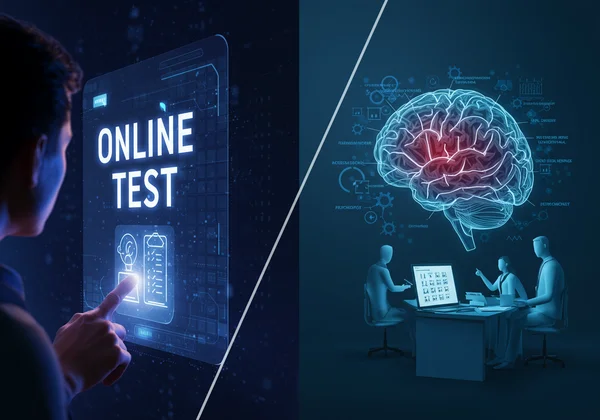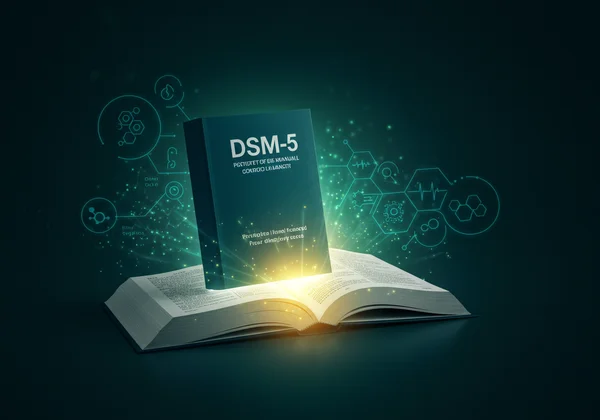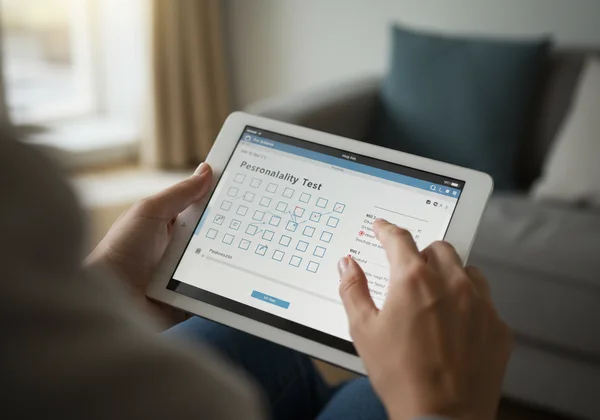공식 소시오패스 테스트: 온라인 선별 검사 vs. 진단
August 26, 2025 | By Roman Caldwell
복잡한 성격 특성에 대한 명확성을 찾을 때 심리 평가의 세계를 탐색하는 것은 혼란스러울 수 있습니다. 여러분은 소시오패스 진단을 위한 공식적인 테스트는 무엇인가요? 라고 궁금해할 수 있습니다. 이 질문은 매우 중요하며, 그 답은 예비 온라인 소시오패스 테스트 와 공식적인 임상 진단 간의 중요한 차이를 이해하는 데 달려 있습니다. 저희의 기밀 도구 와 같은 도구는 귀중한 초기 통찰력을 제공할 수 있지만, 전문적인 평가와는 근본적으로 다릅니다.
이 글은 이 과정을 명확히 하고, 자기 성찰에서 온라인 선별 검사의 역할을 설명하며, 소시오패스와 흔히 연관되는 임상 용어인 반사회성 성격 장애 (ASPD)에 대한 공식적인 진단이 무엇을 의미하는지 설명할 것입니다. 이러한 구분을 이해하는 것이 자신이나 타인에 대한 진정한 통찰력을 얻기 위한 첫 번째이자 가장 중요한 단계입니다.

소시오패스에 대한 공식적인 테스트 는 무엇입니까?
사람들이 "공식적인 소시오패스 테스트"를 검색할 때, 그들은 소시오패스적 특성을 식별하는 확실한 방법을 찾고 있습니다. 임상 심리학의 세계에서는 그러한 명칭의 단일하고 독립적인 테스트는 없습니다. 대신, 진단은 확립된 기준에 따라 자격 있는 정신 건강 전문가가 수행하는 포괄적인 평가 과정의 결과입니다.
DSM-5 기준: 임상 ASPD 진단의 황금 표준
소시오패스 관련 특성에 대한 모든 공식 진단의 초석은 정신 질환 진단 및 통계 편람 제5판 (DSM-5)입니다. 미국 정신의학회에서 발행한 DSM-5는 미국 및 전 세계 많은 지역의 임상의들이 정신 건강 장애를 진단하는 데 사용하는 권위 있는 지침서입니다. 이는 반사회성 성격 장애 (ASPD)에 대한 표준화된 기준을 제공합니다.

ASPD 진단은 타인의 권리를 무시하고 침해하는 만연한 패턴을 필요로 합니다. 이 패턴은 일반적으로 아동기 또는 청소년기 초기에 시작하여 성인기까지 지속됩니다. 주요 진단 기준은 다음 행동 중 최소 세 가지를 보이는 것을 포함합니다:
- 합법적인 행동과 관련된 사회적 규범에 따르지 못함: 이는 종종 체포 사유가 되는 행위를 저지르는 것을 포함하며, 잡히는지 여부와는 상관없습니다.
- 개인적인 이득이나 쾌락을 위해 반복적으로 거짓말을 하거나 타인을 속이는 등의 기만적인 행동: 예를 들어, 승진을 위해 동료를 조종하기 위한 정교한 이야기를 만들거나 재정적 책임을 피하기 위해 습관적으로 가명을 사용하는 것으로 나타날 수 있습니다.
- 충동성 또는 미리 계획하지 못함: 이는 결과에 대한 어떠한 숙고도 없이 갑작스럽게 직장을 그만두거나, 관계를 끝내거나, 여행을 떠나는 결정에서 볼 수 있습니다.
- 과민함 및 공격성, 종종 신체적 싸움으로 이어짐: 사소한 좌절이나 비판에 대해 불균형적인 분노나 신체적 폭력으로 반응하는 경향.
- 자신 또는 타인의 안전에 대한 무모한 태만: 이는 빈번한 음주 운전, 도발 없이 위험한 신체적 싸움에 참여하는 행동, 또는 부양하는 자녀의 안전을 소홀히 하는 것에서 볼 수 있습니다.
- 지속적인 무책임성: 이는 빈번한 지각, 대안 없이 직장을 그만두는 패턴, 또는 채무 불이행을 포함합니다.
- 후회 부족, 타인에게 상처를 주거나 학대하거나 훔친 것에 대해 무관심하거나 그 행동을 합리화함: 개인은 고용주에게서 훔친 것을 "그들은 그럴 여유가 있다"고 말하며 아무렇지 않게 정당화하거나, 파트너에게 감정적으로 해를 끼친 후에도 완전히 무관심하며, 이를 파트너가 "너무 예민해서" 발생한 일이라고 볼 수 있습니다.
임상의는 이러한 기준을 단순한 체크리스트가 아니라 개인의 삶의 역사와 행동 패턴에 대한 훨씬 더 깊은 조사를 위한 틀로 사용합니다.
용어의 미묘한 차이: 소시오패스 vs. 사이코패스
임상 심리학에서는 반사회성 성격 장애 (ASPD)라는 포괄적인 진단을 사용하지만, "소시오패스"와 "사이코패스"라는 용어는 대중 문화와 심지어 일부 법의학적 맥락에서 이 장애의 다른 표현을 설명하기 위해 자주 사용됩니다. 이들이 DSM-5에서 공식적이고 별개의 진단으로 분류되지는 않지만, 행동의 다양한 양상을 이해하는 데 유용할 수 있다는 점을 인지하는 것이 중요합니다.
- 사이코패스: 종종 ASPD의 더 심각한 형태로 간주되며, 사이코패스는 일반적으로 공감 능력의 완전한 결여와 진정한 정서적 애착을 형성할 수 없는 것이 특징입니다. 그들의 조작적인 행동은 종종 계산적이고, 세심하며, 신중하게 계획됩니다. 그들은 매력적이고 성공적인 모습으로 나타날 수 있어, 그들의 근본적인 본성을 감지하기 어렵게 만듭니다.
- 소시오패스: 이 용어는 종종 더 변덕스럽고 충동적인 행동과 연관됩니다. 소시오패스로 묘사되는 개인은 제한적이고 약하지만, 소수의 개인과 공감하거나 애착을 형성할 수 있는 능력을 가질 수 있습니다. 그들의 반사회적 행동은 자발적이고 계획되지 않은 경우가 많아 사회와의 더 빈번하고 명백한 갈등으로 이어질 수 있습니다.
온라인 사이코패스 대 소시오패스 테스트 는 이러한 다른 행동 패턴을 탐색할 수 있지만, 임상 전문가는 ASPD의 핵심 상태를 진단하는 데 중점을 둘 것입니다.
반사회성 성격 장애 (ASPD) 를 진단할 수 있는 사람은 누구입니까?
ASPD의 공식 진단은 온라인 퀴즈나 자가 평가를 통해 이루어질 수 없습니다. 이는 훈련받고 면허를 소지한 정신 건강 전문가의 전문 지식을 필요로 합니다. 이 전문가들은 철저한 평가를 수행하고 유사한 증상을 보일 수 있는 다른 조건을 배제할 수 있는 장비를 갖추고 있습니다.
ASPD를 진단할 자격 있는 전문가는 다음과 같습니다:
- 정신과 의사: 정신 건강을 전문으로 하는 의사 (MD 또는 DO). 이들은 상태를 진단하고, 치료를 제공하며, 약물을 처방할 수 있습니다.
- 임상 심리학자: 심리학 박사 학위 (Ph.D. 또는 Psy.D.)를 소지한 전문가. 이들은 심리 테스트, 평가 및 심리 치료에 훈련받았습니다.
- 면허 있는 치료사 및 상담사: 석사 학위 (예: LPC 또는 LMFT)를 소지하고 정신 건강 상태를 진단하고 치료하도록 훈련받은 전문가.

진단 과정은 포괄적이며, 종종 구조화된 인터뷰, 개인 및 의료 기록 검토, 때로는 가족이나 친구로부터의 보조 정보 (동의하에)를 포함합니다. 이것이 바로 빠른 온라인 소시오패스 테스트 가 시작점일 뿐 결론이 아닌 이유입니다.
온라인 소시오패스 테스트: 목적, 한계 및 정확성
임상 진단과의 구분이 명확해졌으므로, 이제 온라인 선별 도구가 수행하는 중요한 역할에 대해 알아보겠습니다. 저희 플랫폼에서 제공하는 것과 같은 잘 설계된 온라인 소시오패스 테스트는 매우 다르지만 중요한 목적을 수행합니다. 이는 진단 도구가 아니라 자기 성찰과 인식을 돕기 위해 고안된 예비 선별 도구입니다.
온라인 선별 검사가 예비 통찰력 을 제공하는 방법
온라인 선별 검사는 소시오패스적 특성과 연관될 수 있는 행동 및 사고 패턴을 식별하는 데 도움이 되도록 설계되었습니다. 저희 테스트는 DSM-5에서 발견되는 개념을 기반으로 하며, 복잡한 임상 기준을 일련의 접근 가능한 질문으로 번역합니다. 목표는 자신의 성격 특성을 탐색하거나 아는 사람의 행동을 더 잘 이해할 수 있도록 기밀을 유지하며 부담 없는 환경을 제공하는 것입니다.

무료 소시오패스 테스트 와 같은 도구가 여러분에게 도움이 될 수 있는 방법은 다음과 같습니다:
- 자기 인식 증가: 특정 상황에서의 충동성 경향이나 공감 부족과 같이, 본인이 완전히 인지하지 못했을 수 있는 특정 행동 패턴을 강조할 수 있습니다.
- 논의를 위한 시작점: 결과는 여러분의 경험에 대해 구조화된 방식으로 사고할 수 있는 기회를 제공하며, 치료사와 상담하기로 결정할 경우 유용한 시작점이 될 수 있습니다.
- 교육적 가치: 학생이나 심리학 애호가에게 이러한 테스트는 성격 특성이 어떻게 측정되고 개념화되는지에 대한 실제적인 시각을 제공합니다.
- 기밀성 및 접근성: 저희 도구는 무료이며 익명으로 15개 이상의 언어로 제공되어, 어디서든 누구에게나 접근 가능한 첫 단계가 됩니다. 여러분은 집에서 편안하게 자신의 특성을 탐색 할 수 있습니다.
구분의 이해: 선별 검사 vs. 진단
선별 검사와 진단이 두 가지 별개의 과정임을 이해하는 것이 중요합니다. 선별 검사는 추가 조사를 보증할 수 있는 잠재적 징후를 식별하기 위해 넓은 그물을 던집니다. 이를 연기 감지기처럼 생각하십시오. 화재 가능성을 알려주지만, 화재의 원인이나 정도를 알려주지는 않습니다. 이를 위해서는 소방관 (임상 전문가)이 필요합니다.
온라인에서 찾을 수 있는 반사회성 성격 장애 테스트 는 개인의 삶, 맥락 및 역사의 미묘한 차이를 포착할 수 없습니다. 다른 조건을 배제하거나 답변 뒤에 숨겨진 "이유"를 이해할 수 없습니다. 반면에 진단은 전문가가 내리는 상세하고 다면적인 임상적 판단입니다. 저희의 목표는 여러분에게 정보를 제공하는 것이지, 여러분에게 꼬리표를 붙이는 것이 아닙니다.
ASPD 특성에 대한 전문가 평가를 받아야 할 때
온라인 선별 도구의 결과가 여러분에게 와닿거나 우려를 불러일으킨다면, 전문가 평가를 고려해야 할 신호일 수 있습니다. 여러분이나 여러분이 아는 사람이 앞에서 언급된 행동 패턴으로 인해 관계, 직업 또는 법률과 관련하여 심각한 어려움을 겪고 있다면, 정신 건강 전문가와 상담하는 것이 책임감 있고 용기 있는 다음 단계입니다.
다음과 같은 유형의 행동 패턴이 실질적인 부정적인 결과로 이어진다면 전문가에게 연락하는 것을 고려하십시오:
- 법적 문제: 반복적인 체포, 소송 또는 사법 시스템과의 기타 법적 문제.
- 관계 불안정: 변덕스럽고, 조종적이거나, 학대적인 관계를 맺고 나쁘게 끝나는 이력.
- 직업적 실패: 동료와의 갈등, 무책임함, 또는 회사 규정 위반으로 인해 꾸준한 직업을 유지하지 못하는 경우.
- 재정적 곤란: 부채, 청구서 미납, 또는 타인을 재정적으로 착취하는 습관.
- 타인의 피드백: 여러 명의 신뢰하는 친구, 가족 또는 파트너가 귀하의 행동과 그로 인한 영향에 대해 심각한 우려를 표명한 경우.

임상 평가 준비: 예상할 수 있는 사항
임상 평가에 대한 생각은 위협적일 수 있지만, 이는 단순히 여러분을 더 잘 이해하기 위한 대화입니다. 준비를 위해 개인적인 경험, 주요 관계 및 우려되는 특정 사건들에 대한 생각을 정리할 수 있습니다. 대화를 시작하는 방법으로 저희 예비 평가 의 결과나 통찰력을 가져올 수도 있습니다.
평가 동안 전문가는 여러분의 생각, 감정, 행동에 대해 과거와 현재 모두에 걸쳐 질문할 것입니다. 정직함은 여러분의 상황에 대한 정확한 그림을 얻는 데 중요합니다. 목표는 여러분을 판단하는 것이 아니라 치료, 기술 개발 또는 기타 지원 전략을 포함하여 앞으로 나아갈 길을 찾는 데 도움을 주는 것입니다.
이해와 지원을 향한 여러분의 길을 탐색하기
자기 이해를 향한 여정은 복잡하며, 탐색을 위한 도구는 다양한 형태로 제공됩니다. 온라인에서 할 수 있는 단일한 "공식적인 소시오패스 테스트"는 없지만, ASPD에 대한 DSM-5 기준에 기반한 임상 평가를 통한 공식 진단을 위한 명확하고 확립된 경로가 있습니다.
온라인 선별 검사는 기밀하고 접근 가능한 첫 단계로서 중요한 역할을 합니다. 이들은 자기 성찰을 위한 거울을 제공하여, 여러분이 더 탐색하고 싶을 수 있는 특성과 패턴을 식별하는 데 도움을 줍니다. 궁금하거나 우려된다면, 저희 도구를 의도된 대로 사용하시기를 권장합니다: 통찰력을 얻기 위한 시작점으로 말입니다.
자기 발견 여정의 첫 걸음을 내딛을 준비가 되셨습니까? 오늘 저희의 무료 기밀 테스트로 자기 성찰을 시작 하십시오. 기억하십시오, 이것은 통찰력을 위한 도구이지 진단이 아닙니다. 결과가 우려를 불러일으킨다면, 가장 강력한 다음 단계는 자격 있는 정신 건강 전문가와 상담하여 지도와 지원을 받는 것입니다.
소시오패스 테스트 및 진단에 대한 자주 묻는 질문
소시오패스는 어떻게 공식적으로 진단됩니까?
소시오패스는 임상적으로 반사회성 성격 장애 (ASPD)로 이해됩니다. 공식 진단은 정신과 의사나 임상 심리학자와 같은 면허를 소지한 정신 건강 전문가가 포괄적인 평가를 통해 내립니다. 이 과정은 임상 인터뷰와 DSM-5 기준에 기반한 장기적인 행동 패턴 평가를 포함합니다. 이는 간단한 테스트로 결정될 수 있는 것이 아닙니다.
온라인 소시오패스 테스트로는 제가 소시오패스인지 알려줄 수 있습니까?
아니요, 온라인 테스트로는 진단을 내릴 수 없습니다. 저희 웹사이트의 무료 소시오패스 테스트 와 같이 신뢰할 수 있는 온라인 선별 검사는 자기 성찰을 위한 교육적 도구로 설계되었습니다. 이들은 ASPD와 관련된 특성을 식별하는 데 도움을 줄 수 있지만, 자격 있는 전문가의 공식적인 평가를 대체할 수는 없습니다.
온라인 테스트가 강조하는 소시오패스의 주요 징후는 무엇입니까?
온라인 테스트는 일반적으로 ASPD에 대한 DSM-5 기준에 명시된 주요 행동 특성에 초점을 맞춥니다. 여기에는 종종 규칙 및 사회적 규범 무시, 기만적인 행동, 충동성, 공격성, 후회 부족, 그리고 관계 유지의 어려움 등이 포함됩니다. 이러한 영역과 관련된 질문에 답함으로써, 자신의 패턴이 ASPD와 관련된 패턴과 일치하는지에 대한 초기 통찰력을 얻을 수 있습니다.